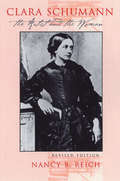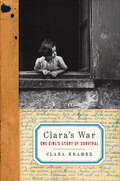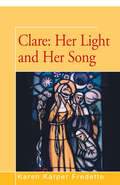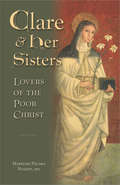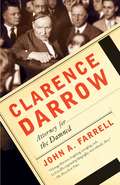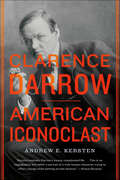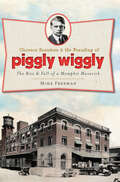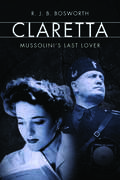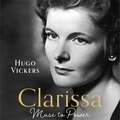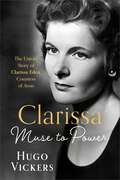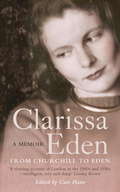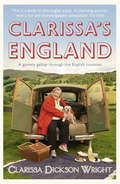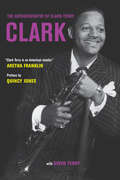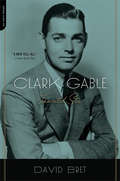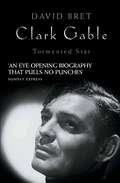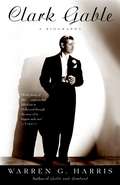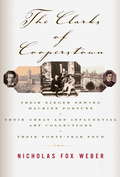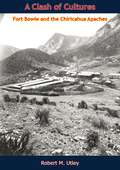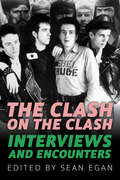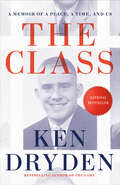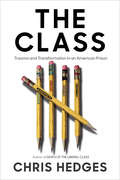- Table View
- List View
Clara Schumann: The Artist and the Woman
by Nancy B. ReichThis absorbing and award-winning biography tells the story of the tragedies and triumphs of Clara Wieck Schumann (1819-1896), a musician of remarkable achievements. At once artist, composer, editor, teacher, wife, and mother of eight children, she was an important force in the musical world of her time. To show how Schumann surmounted the obstacles facing female artists in the nineteenth century, Nancy B. Reich has drawn on previously unexplored primary sources: unpublished diaries, letters, and family papers, as well as concert programs. Going beyond the familiar legends of the Schumann literature, she applies the tools of musicological scholarship and the insights of psychology to provide a new, full-scale portrait.The book is divided into two parts. In Part One, Reich follows Clara Schumann's life from her early years as a child prodigy through her marriage to Robert Schumann and into the forty years after his death, when she established and maintained an extraordinary European career while supporting and supervising a household and seven children. Part Two covers four major themes in Schumann's life: her relationship with Johannes Brahms and other friends and contemporaries; her creative work; her life on the concert stage; and her success as a teacher.Throughout, excerpts from diaries and letters in Reich's own translations clear up misconceptions about her life and achievements and her partnership with Robert Schumann. Highlighting aspects of Clara Schumann's personality and character that have been neglected by earlier biographers, this candid and eminently readable account adds appreciably to our understanding of a fascinating artist and woman.For this revised edition, Reich has added several photographs and updated the text to include recent discoveries. She has also prepared a Catalogue of Works that includes all of Clara Schumann's known published and unpublished compositions and works she edited, as well as descriptions of the autographs, the first editions, the modern editions, and recent literature on each piece. The Catalogue also notes Schumann's performances of her own music and provides pertinent quotations from letters, diaries, and contemporary reviews.
Clara's War: One Girl's Story of Survival
by Clara KramerIn the classic vein of The Diary of Anne Frank—a heart-wrenching and inspiring story of a life lived in fear and cramped quarters—Clara’s War is a true story of the Holocaust.Cara Kramer was a typical Polish-Jewish teenager from a small town at the outbreak of the Second World War. When the Germans invaded, Clara's family was taken in by the Becks, a Volksdeutsche (ethnically German) family from their town. Mrs. Beck worked as Clara's family's housekeeper. Mr. Beck was known to be an alcoholic, a womanizer, and a vocal anti-Semite. But on hearing that Jewish families were being led into the woods and shot, Beck sheltered the Kramers and two other Jewish families.Eighteen people in all lived in a bunker dug out of the Becks' basement. Fifteen-year-old Clara kept a diary during the twenty terrifying months she spent in hiding, writing down details of their unpredictable life—from the house's catching fire to Mr. Beck's affair with Clara's neighbor; from the nightly SS drinking sessions in the room above to the small pleasure of a shared Christmas carp. Against all odds, Clara lived to tell her story, and her diary is now part of the permanent col-lection of the United States Holocaust Memorial Museum in Washington, D.C.
Clare: Her Light and Her Song
by Karen FredetteClare: Her Light and Her Song is a vivid portrait of a strong woman who scandalizes family and friends to follow her beloved mentor, Francis of Assisi, in a life of joyous poverty. Thoroughly researched, this biography faithfully depicts Clare as seen by her contemporaries, including cardinals and popes. Her story is enriched by accounts of the wars, political intrigues, and towering figures of the tumultuous thirteenth century in which she played a significant role. The first woman to receive Papal approval for her own Rule of Life, Clare continues as a model for women of the twenty-first century.
Clare and Her Sisters
by Madeline Pecora NugentNugent bases her work on extensive research, time spent in Assisi, and interviews with Franciscan experts. On this solid foundation, she builds Clare's story, founder of the Poor Clares, through vignettes of various characters--some historical, some fictional--creating an authentic biography with the appeal of a novel.
Clarence Darrow: Attorney for the Damned
by John A. FarrellDrawing on untapped archives and full of fresh revelations, here is the definitive biography of America's legendary defense attorney and progressive hero.Clarence Darrow is the lawyer every law school student dreams of being: on the side of right, loved by many women, played by Spencer Tracy in Inherit the Wind. His days-long closing arguments delivered without notes won miraculous reprieves for men doomed to hang. Darrow left a promising career as a railroad lawyer during the tumultuous Gilded Age in order to champion poor workers, blacks, and social and political outcasts against big business, Jim Crow, and corrupt officials. He became famous defending union leader Eugene Debs in the landmark Pullman Strike case and went from one headline case to the next--until he was nearly crushed by an indictment for bribing a jury. He redeemed himself in Dayton, Tennessee, defending schoolteacher John Scopes in the "Monkey Trial," cementing his place in history. Now, John A. Farrell draws on previously unpublished correspondence and memoirs to offer a candid account of Darrow's divorce, affairs, and disastrous finances; new details of his feud with his law partner, the famous poet Edgar Lee Masters; a shocking disclosure about one of his most controversial cases; and explosive revelations of shady tactics he used in his own trial for bribery. Clarence Darrow is a sweeping, surprising portrait of a legendary legal mind.From the Hardcover edition.
Clarence Darrow: American Iconoclast
by Andrew E. KerstenClarence Darrow is best remembered for his individual cases, whether defending the thrill killers Leopold and Loeb or John Scopes's right to teach evolution in the classroom. In the first full-length biography of Darrow in decades, the historian Andrew E. Kersten narrates the complete life of America's most legendary lawyer and the struggle that defined it, the fight for the American traditions of individualism, freedom, and liberty in the face of the country's inexorable march toward modernity. Prior biographers have all sought to shoehorn Darrow, born in 1857, into a single political party or cause. But his politics do not define his career or enduring importance. Going well beyond the familiar story of the socially conscious lawyer and drawing upon new archival records, Kersten shows Darrow as early modernity's greatest iconoclast. What defined Darrow was his response to the rising interference by corporations and government in ordinary working Americans' lives: he zealously dedicated himself to smashing the structures and systems of social control everywhere he went. During a period of enormous transformations encompassing the Gilded Age and the Progressive Era, Darrow fought fiercely to preserve individual choice as an ever more corporate America sought to restrict it.
Clarence Saunders & the Founding of Piggly Wiggly: The Rise & Fall of a Memphis Maverick (Landmarks Ser.)
by Mike FreemanThe life and career—including both the highs and the lows—of the visionary businessman who started the iconic supermarket chain. The grocery business began as a complicated service industry. Random pricing, inconsistent quantities and prescriptive salesmen made grocery shopping burdensome. It took one brash Memphian with uncommon vision and unbridled ambition to change everything. Clarence Saunders worked his way out of poverty and obscurity to found Piggly Wiggly in 1916. With an unprecedented approach, he virtually invented the concept of the modern self-service grocery store. Stores flourished, franchises spread, and Saunders made millions. Yet just as the final bricks of Pink Palace—his garish marble mansion—were being laid, Saunders went bankrupt, and he was forced to sell Piggly Wiggly. A variety of new ventures helped Saunders out of bankruptcy, but he never duplicated his prior success. Memphis historian Mike Freeman tracks the remarkable life of this retail visionary.
Claretta: Mussolini's Last Lover
by R. J. BosworthA master historian illuminates the tumultuous relationship of Il Duce and his young lover Claretta, whose extraordinarily intimate diaries only recently have become available Few deaths are as gruesome and infamous as those of Benito Mussolini, Italy's fascist dictator, and Claretta (or Clara) Petacci, his much-younger lover. Shot dead by Italian partisans after attempting to flee the country in 1945, the couple's bodies were then hanged upside down in Milan's main square in ignominious public display. This provocative book is the first to mine Clara's extensive diaries, family correspondence, and other sources to discover how the last in Mussolini's long line of lovers became his intimate and how she came to her violent fate at his side. R. J. B. Bosworth explores the social climbing of Claretta's family, her na#65533;ve and self-interested commitment to fascism, her diary's graphically detailed accounts of sexual life with Mussolini, and much more. Brimful of new and arresting information, the book sheds intimate light not only on an ordinary-extraordinary woman living at the heart of Italy's totalitarian fascist state but also on Mussolini himself.
CLARISSA: Muse to Power, The Untold Story of Clarissa Eden, Countess of Avon
by Hugo Vickers'Hugo Vickers brings tremendous authority to this life of one of the most significant and intriguing political wives of the last century. The integrity of his scholarship and his deep personal knowledge of his subject make this a compelling and definitive work.' - Professor Simon Heffer'A vivid portrayal of a remarkable and unusual woman, her world, and her times. Hugely enjoyable.' - Jung Chang'An engrossing and intimate biography of a remarkable and fascinating woman. Hugo Vickers deftly captures Clarissa's enigmatic personality and the glamorous world in which she moved.' - Robert Harris-----Clarissa Eden, Countess of Avon, wife of Prime Minister Anthony Eden, once famously said: 'For the past few weeks I have really felt as if the Suez Canal was flowing through my drawing-room.'With her impressive intellect and acerbic wit, she was a highly influential muse to many leading figures over several decades.At Oxford in the 1940s she fascinated dons and undergraduates alike. She went on to work in the film world for Alexander Korda and for George Weidenfeld at Contact Magazine. She was a close friend of Cecil Beaton, James Pope-Hennessy, Lucian Freud, Isaiah Berlin, and Lord Goodman. She fascinated Greta Garbo.After an early Bohemian life, she became a politically active wife to Eden when he was Foreign Secretary and Prime Minister, particularly during the Suez Crisis in 1956.Her death at 101 in 2021 has opened the way for this enthralling and revealing biography by the widely admired biographer Hugo Vickers. He knew her well for over 40 years, and consigned her revealing private papers and sharply written diaries to him.Here also are first hand contributions from friends such as Antonia Fraser. Clarissa Eden's story sheds invaluable light on a rapidly vanishing age and an extraordinary woman.
CLARISSA: Muse to Power, The Untold Story of Clarissa Eden, Countess of Avon
by Hugo Vickers'Hugo Vickers brings tremendous authority to this life of one of the most significant and intriguing political wives of the last century. The integrity of his scholarship and his deep personal knowledge of his subject make this a compelling and definitive work.' - Professor Simon Heffer'A vivid portrayal of a remarkable and unusual woman, her world, and her times. Hugely enjoyable.' - Jung Chang'An engrossing and intimate biography of a remarkable and fascinating woman. Hugo Vickers deftly captures Clarissa's enigmatic personality and the glamorous world in which she moved.' - Robert Harris-----Clarissa Eden, Countess of Avon, wife of Prime Minister Anthony Eden, once famously said: 'For the past few weeks I have really felt as if the Suez Canal was flowing through my drawing-room.'With her impressive intellect and acerbic wit, she was a highly influential muse to many leading figures over several decades.At Oxford in the 1940s she fascinated dons and undergraduates alike. She went on to work in the film world for Alexander Korda and for George Weidenfeld at Contact Magazine. She was a close friend of Cecil Beaton, James Pope-Hennessy, Lucian Freud, Isaiah Berlin, and Lord Goodman. She fascinated Greta Garbo.After an early Bohemian life, she became a politically active wife to Eden when he was Foreign Secretary and Prime Minister, particularly during the Suez Crisis in 1956.Her death at 101 in 2021 has opened the way for this enthralling and revealing biography by the widely admired biographer Hugo Vickers. He knew her well for over 40 years, and consigned her revealing private papers and sharply written diaries to him.Here also are first hand contributions from friends such as Antonia Fraser. Clarissa Eden's story sheds invaluable light on a rapidly vanishing age and an extraordinary woman.
CLARISSA: Muse to Power, The Untold Story of Clarissa Eden, Countess of Avon
by Hugo VickersA The Week Book of the Week'Hugo Vickers brings tremendous authority to this life of one of the most significant and intriguing political wives of the last century. The integrity of his scholarship and his deep personal knowledge of his subject make this a compelling and definitive work.' - Professor Simon Heffer'A vivid portrayal of a remarkable and unusual woman, her world, and her times. Hugely enjoyable.' - Jung Chang'An engrossing and intimate biography of a remarkable and fascinating woman. Hugo Vickers deftly captures Clarissa's enigmatic personality and the glamorous world in which she moved.' - Robert Harris'Affectionate, crisp and gossipy . . . What a lost world this book captures' - Ysenda Maxtone Graham, The Times'A lissom, festive and very endearing biography' - Richard Davenport-Hines, Literary Review'She made Hugo Vickers her literary executor in 1985, meaning that he had complete access to her diaries and letters' - Lynn Barber, The Daily Telegraph'It is hard to think of another living author with such a wide knowledge of Clarissa's world, and Vickers's diligent, skilful biography is unfailingly readable - John Jolliffe, The Spectator-----Clarissa Eden, Countess of Avon, wife of Prime Minister Anthony Eden, once famously said: 'For the past few weeks I have really felt as if the Suez Canal was flowing through my drawing-room.'With her impressive intellect and acerbic wit, she was a highly influential muse to many leading figures over several decades.At Oxford in the 1940s she fascinated dons and undergraduates alike. She went on to work in the film world for Alexander Korda and for George Weidenfeld at Contact Magazine. She was a close friend of Cecil Beaton, James Pope-Hennessy, Lucian Freud, Isaiah Berlin, and Lord Goodman. She fascinated Greta Garbo.After an early Bohemian life, she became a politically active wife to Eden when he was Foreign Secretary and Prime Minister, particularly during the Suez Crisis in 1956.Her death at 101 in 2021 has opened the way for this enthralling and revealing biography by the widely admired biographer Hugo Vickers. He knew her well for over 40 years, and consigned her revealing private papers and sharply written diaries to him.Here also are first hand contributions from friends such as Antonia Fraser. Clarissa Eden's story sheds invaluable light on a rapidly vanishing age and an extraordinary woman.
Clarissa Eden: A Memoir - From Churchill To Eden
by Clarissa EdenA Memoir by Clarissa Eden, born a Churchill and a Prime Minister's wife at the age of 34.In 1955, at the astonishingly young age of 34, Clarissa Eden entered No. 10 Downing Street as the wife of the new Prime Minister, Anthony Eden. Born Clarissa Churchill in 1920, her uncle was the great Winston, and when she married the 55-year-old Eden, then Foreign Secretary, at Caxton Hall register office in 1952, there were crowds as big as the gathering that had cheered Elizabeth Taylor and Michael Wilding's wedding there six months earlier.A renowned beauty, she was at home with her mother's Liberal intellectual circle, and mixed in her youth with the pillars of Oxford's academic community - Isaiah Berlin, Maurice Bowra and David Cecil among them: according to Antonia Fraser, she was 'the don's delight because she was beautiful and extremely intellectual'. Her close circle of friends included some of the leading cultural figures of the twentieth century: Cecil Beaton, Evelyn Waugh, Orson Welles among them. Her observations and insights into these men and their world provide a unique window into the mid 20th century. As the spouse of the most important man in Britain, the hostess at No. 10 and Chequers, Clarissa Eden was inevitably privy to a multitude of top-level secrets. The Suez crisis and Eden's ill health meant that she shared just four years of Anthony's political life and eighteen months as Prime Minister's wife. This individual, discriminating and honest memoir is her first account of extraordinary times, intuitively edited by Cate Haste, co-author of The Goldfish Bowl.
Clarissa Eden: A Memoir - From Churchill To Eden
by Cate Haste Clarissa EdenA Memoir by Clarissa Eden, born a Churchill and a Prime Minister's wife at the age of 34.In 1955, at the astonishingly young age of 34, Clarissa Eden entered No. 10 Downing Street as the wife of the new Prime Minister, Anthony Eden. Born Clarissa Churchill in 1920, her uncle was the great Winston, and when she married the 55-year-old Eden, then Foreign Secretary, at Caxton Hall register office in 1952, there were crowds as big as the gathering that had cheered Elizabeth Taylor and Michael Wilding's wedding there six months earlier.A renowned beauty, she was at home with her mother's Liberal intellectual circle, and mixed in her youth with the pillars of Oxford's academic community - Isaiah Berlin, Maurice Bowra and David Cecil among them: according to Antonia Fraser, she was 'the don's delight because she was beautiful and extremely intellectual'. Her close circle of friends included some of the leading cultural figures of the twentieth century: Cecil Beaton, Evelyn Waugh, Orson Welles among them. Her observations and insights into these men and their world provide a unique window into the mid 20th century. As the spouse of the most important man in Britain, the hostess at No. 10 and Chequers, Clarissa Eden was inevitably privy to a multitude of top-level secrets. The Suez crisis and Eden's ill health meant that she shared just four years of Anthony's political life and eighteen months as Prime Minister's wife. This individual, discriminating and honest memoir is her first account of extraordinary times, intuitively edited by Cate Haste, co-author of The Goldfish Bowl.
Clarissa's England: A gamely gallop through the English counties
by Clarissa Dickson WrightThe quintessential Englishwoman Clarissa Dickson Wright, one of the Two Fat Ladies and author of Spilling the Beans, takes us on a personal journey through the country of her birth.From Cornwall to Cumbria, Norfolk to Northumbria she brings her extraordinary knowledge, huge passion, forthright opinions and inimitable wit to the distinctive history and regional character of every corner of England.In her cornucopia of local knowledge she reveals, for example, how Boudicca was the original Essex girl, that Lincolnshire has a coriander crop second only in size to India's, and just why a Cornish pasty should never contain carrots.As much an entertaining narrative as it is a travel companion, Clarissa's England will amuse, enlighten, surprise and delight all those who read it.
Clarissa's England: A Gamely Gallop Through the English Counties
by Clarissa Dickson WrightThe quintessential Englishwoman Clarissa Dickson Wright, one of the Two Fat Ladies and author of Spilling the Beans, takes us on a personal journey through the country of her birth.From Cornwall to Cumbria, Norfolk to Northumbria she brings her extraordinary knowledge, huge passion, forthright opinions and inimitable wit to the distinctive history and regional character of every corner of England.In her cornucopia of local knowledge she reveals, for example, how Boudicca was the original Essex girl, that Lincolnshire has a coriander crop second only in size to India's, and just why a Cornish pasty should never contain carrots.As much an entertaining narrative as it is a travel companion, Clarissa's England will amuse, enlighten, surprise and delight all those who read it.
Clark: The Autobiography of Clark Terry
by Gwen Terry Clark Terry Quincy Jones Bill CosbyCompelling from cover to cover, this is the story of one of the most recorded and beloved jazz trumpeters of all time. With unsparing honesty and a superb eye for detail, Clark Terry, born in 1920, takes us from his impoverished childhood in St. Louis, Missouri, where jazz could be heard everywhere, to the smoke-filled small clubs and carnivals across the Jim Crow South where he got his start, and on to worldwide acclaim. Terry takes us behind the scenes of jazz history as he introduces scores of legendary greats--Ella Fitzgerald, Oscar Peterson, Dizzy Gillespie, Dinah Washington, Doc Severinsen, Ray Charles, Thelonious Monk, Billie Holiday, Sarah Vaughan, Coleman Hawkins, Zoot Sims, and Dianne Reeves, among many others. Terry also reveals much about his own personal life, his experiences with racism, how he helped break the color barrier in 1960 when he joined the Tonight Show band on NBC, and why--at ninety years old--his students from around the world still call and visit him for lessons.
Clark Gable: Tormented Star
by David BretFrom the acclaimed author of Joan Crawford comes a riveting and uncensored biography of Clark Gable. The archetypal male of his era, Gable was named "King of Hollywood" in 1938. But as David Bret reveals, the star was not quite who he seemed.<P><P> One of Gable's best-kept secrets was his bisexuality. Bret recounts Gable's failed marriages to women who turned a blind eye toward his affairs with actors Earl Larimore and Rod La Rocque, among other men. Bret also reveals how a pseudo-scandalous paternity suit and the actor's wartime accomplishments were no more than elaborate publicity stunts created by studio chief Louis B. Mayer in order to exaggerate Gable's masculinity and heroism in the public eye. With passion and accuracy, Bret uncovers the truth behind one of Hollywood's biggest stars.
Clark Gable: Tormented Star
by David BretClark Gable was perceived as the archetypal Hollywood superman, the kind of man that women lusted after and their husbands envied. However, as David Bret reveals in this powerful biography, in the early days of his career, with his squinty teeth and fondness for men as well as woman, he was anything but the wholesome figure he appeared. Gable was adopted by the &‘Sewing Circle&’ – the group that included Jean Harlow and, ironically, Carole Lombard, the great love of his life. Bret also reveals how Gable&’s wartime &‘heroics&’, which saw him promoted through the ranks from Private to Major in less than a year, were no more than an elaborate publicity stunt. Like an earlier paternity suit, it was an exercise dreamed up by studio chief, Louis B. Mayer to promote and protect Gable&’s image. After ending an affair with Ben Maddox in 1942, Gable seems to have &‘gone straight&’, from which point Bret moves into more familiar territory, focusing on Gable&’s great movies including Gone With the Wind and on his affairs with Joan Crawford, Ava Gardner and other famous stars. Drawing on a wealth of unpublished material, Bret pulls no punches in this star-studded story of Gable&’s life, told with candour and panache. David Bret is one of Britain&’s leading showbusiness biographers, and an authority on the chanson. His many highly successful books incllde: Edth Piaf, Joan Crawford, Jean Harlow, Errol Flynn and the soon to be published Mario Lanza (all from JR Books)
Clark Gable: A Biography
by Warren G. HarrisClark Gable arrived in Hollywood after a rough-and-tumble youth, and his breezy, big-boned, everyman persona quickly made him the town's king. He was a gambler among gamblers, a heavy drinker in the days when everyone drank seemingly all the time, and a lover to legions of the most attractive women in the most glamorous business in the world, including the great love of his life, Carole Lombard.In this well-researched and revealing biography, Warren G. Harris gives an exceptionally acute portrait of one of the most memorable actors in the history of motion pictures--whose intimates included such legends as Marilyn Monroe, Joan Crawford, Loretta Young, David O. Selznick, Jean Harlow, Judy Garland, Lana Turner, Spencer Tracy, and Grace Kelly--as well as a vivid sense of the glamour and excess of mid-century Hollywood.From the Trade Paperback edition.
The Clarks of Cooperstown
by Nicholas Fox WeberNicholas Fox Weber, author of the acclaimed Patron Saints ("Exhilarating avant-garde entertainment"--Sam Hunter, The New York Times Book Review) and Balthus ("The authoritative account of his life and work"--Michael Ravitch, Newsday), gives us now the idiosyncratic lives of Sterling and Stephen Clark--two of America's greatest art collectors, heirs to the Singer sewing machine fortune, and for decades enemies of each other. He tells the story, as well, of the two generations that preceded theirs, giving us an intimate portrait of one of the least known of America's richest families.He begins with Edward Clark--the brothers' grandfather, who amassed the Clark fortune in the late-nineteenth century--a man with nerves of steel; a Sunday school teacher who became the business partner of the wild inventor and genius Isaac Merritt Singer. And, by the turn of the twentieth century, was the major stockholder of the Singer Manufacturing Company.We follow Edward's rise as a real estate wizard making headlines in 1880 when he commissioned Manhattan's first luxury apartment building. The house was called "Clark's Folly"; today it's known as the Dakota.We see Clark's son--Alfred--enigmatic and famously reclusive; at thirty-eight he inherited $50 million and became one of the country's richest men. An image of propriety--good husband, father of four--in Europe, he led a secret homosexual life. Alfred was a man with a passion for art and charity, which he passed on to his four sons, in particular Sterling and Stephen Clark.Sterling, the second-oldest, buccaneering and controversial, loved impressionism, created his own museum in Williamstown, Massachusetts--and shocked his family by marrying an actress from the Comédie Française. Together the Sterling Clarks collected thousands of paintings and bred racehorses.In a highly public case, Sterling sued his three brothers over issues of inheritance, and then never spoke to them again.He was one of the central figures linked to a bizarre and little-known attempted coup against Franklin Delano Roosevelt's presidency. We are told what really happened and why--and who in American politics was implicated but never prosecuted.Sterling's brother--Stephen--self-effacing and responsible--became chairman and president of the Museum of Modern Art and gave that institution its first painting, Edward Hopper's House by the Railroad. Thirteen years later, in an act that provoked intense controversy, Stephen dismissed the Museum's visionary founding director, Alfred Barr, who for more than a decade had single-handedly established the collection and exhibition programs that determined how the art of the twentieth century was regarded.Stephen gave or bequeathed to museums many of the paintings that today are still their greatest attractions.With authority, insight, and a flair for evoking time and place, Weber examines the depths of the brothers' passions, the vehemence of their lifelong feud, the great art they acquired, and the profound and lasting impact they had on artistic vision in America.From the Hardcover edition.
The Clarks of Cooperstown
by Nicholas Fox WeberNicholas Fox Weber, author of the acclaimed Patron Saints ("Exhilarating avant-garde entertainment"--Sam Hunter, The New York Times Book Review) and Balthus ("The authoritative account of his life and work"--Michael Ravitch, Newsday), gives us now the idiosyncratic lives of Sterling and Stephen Clark--two of America's greatest art collectors, heirs to the Singer sewing machine fortune, and for decades enemies of each other. He tells the story, as well, of the two generations that preceded theirs, giving us an intimate portrait of one of the least known of America's richest families.He begins with Edward Clark--the brothers' grandfather, who amassed the Clark fortune in the late-nineteenth century--a man with nerves of steel; a Sunday school teacher who became the business partner of the wild inventor and genius Isaac Merritt Singer. And, by the turn of the twentieth century, was the major stockholder of the Singer Manufacturing Company.We follow Edward's rise as a real estate wizard making headlines in 1880 when he commissioned Manhattan's first luxury apartment building. The house was called "Clark's Folly"; today it's known as the Dakota.We see Clark's son--Alfred--enigmatic and famously reclusive; at thirty-eight he inherited $50 million and became one of the country's richest men. An image of propriety--good husband, father of four--in Europe, he led a secret homosexual life. Alfred was a man with a passion for art and charity, which he passed on to his four sons, in particular Sterling and Stephen Clark.Sterling, the second-oldest, buccaneering and controversial, loved impressionism, created his own museum in Williamstown, Massachusetts--and shocked his family by marrying an actress from the Comédie Française. Together the Sterling Clarks collected thousands of paintings and bred racehorses.In a highly public case, Sterling sued his three brothers over issues of inheritance, and then never spoke to them again.He was one of the central figures linked to a bizarre and little-known attempted coup against Franklin Delano Roosevelt's presidency. We are told what really happened and why--and who in American politics was implicated but never prosecuted.Sterling's brother--Stephen--self-effacing and responsible--became chairman and president of the Museum of Modern Art and gave that institution its first painting, Edward Hopper's House by the Railroad. Thirteen years later, in an act that provoked intense controversy, Stephen dismissed the Museum's visionary founding director, Alfred Barr, who for more than a decade had single-handedly established the collection and exhibition programs that determined how the art of the twentieth century was regarded.Stephen gave or bequeathed to museums many of the paintings that today are still their greatest attractions.With authority, insight, and a flair for evoking time and place, Weber examines the depths of the brothers' passions, the vehemence of their lifelong feud, the great art they acquired, and the profound and lasting impact they had on artistic vision in America.From the Hardcover edition.
A Clash of Cultures: Fort Bowie and the Chiricahua Apaches
by Robert M. UtleyRelates the history of the Apache Indians and of the Apache Wars of the 1800's. The Apache Wars ended with the surrender of their leader Geronimo. The parts played by Apaches Geronimo and Cochise, United States Army officers, Oliver Otis Howard, George Crook, and Nelson A. Miles, and many others are given in the narrative. Today the ruins of Fort Bowie, Arizona, stand as a monument commemorating the struggle of the Indians to maintain their way of life in the face of the white man's determination to conquer the wilderness.
The Clash on Clash: Interviews and Encounters
by Sean EganThe Clash thought they could change the world. They never did, but they created some of the greatest rock music of all time in the attempt.Clash interviews were mesmerizing. Infused with the messianic spirit of punk, the Clash engaged with the press like no rock group before or since, treating interviews almost as addresses to the nation. Their pronouncements were welcomed but were hardly uncritically reported. The Clash's back pages are voluminous, crackle with controversy, and constitute a snapshot of a uniquely thoughtful and fractious period in modern history. Included in this compendium are the Clash's encounters with the most brilliant music writers of their time, including Lester Bangs, Nick Kent, Mikal Gilmore, Chris Salewicz, Charles Shaar Murray, Mick Farren, Kris Needs, and Lenny Kaye.Whether it be their audience with the (mainly) simpatico likes of punk fanzine Sniffin' Glue, their testy encounters with the correspondents of pious UK weeklies like New Musical Express, Melody Maker, and Sounds, or their friendlier but no less eyebrow-raising conversations with US periodicals like Creem and Rolling Stone, the Clash consistently created copy that lived up to their sobriquet "The Only Band That Matters."
The Class: A Memoir of a Place, a Time, and Us
by Ken DrydenINSTANT NATIONAL BESTSELLER • Shortlisted for the 2024 Speaker&’s Book AwardFrom bestselling author Ken Dryden, a riveting new book.On Tuesday, September 6, 1960, the day after Labour Day, class 9G at Etobicoke Collegiate Institute in a suburb of Toronto assembled for the first time. Its thirty-five students, having written special exams, came to be known as the &“Selected Class.&”They would stay together through high school, with few exceptions. They would spend more than two hundred days a year together. Few had known each other before. Few have been in other than accidental contact in all the decades since.Their ancestors were almost all from working-class backgrounds. Their parents had lived their formative years through depression and war. They themselves were born into a postwar world of new homes, new schools, new churches. New suburbs. Of new classes like this one. Of boundless possibilities.When almost anything seems within reach, what do we reach for?Ken Dryden was one of these thirty-five. In his varied, improbable life, he had wondered often how he had gotten from there to here. How any of us do. He decided to try and find his classmates, to see how they are, what they are doing, how life has been for them. They talked many long hours, in a way they had never talked before. Most had married, some divorced, most have kids, many have grandkids.This is the story of a place, a time, and so much more.
The Class: Trauma and Transformation in an American Prison
by Chris Hedges"This book could change everything. It could change our minds. It could buttress our hearts. It could make graspable why today&’s prisons are contemporary slave plantations. I couldn&’t put it down and I tried." —Alice Walker, author of The Color PurpleA haunting and powerfully moving book that gives voice to the poorest among us and lays bare the cruelty of a penal system that too often defines their lives.In this unforgettable work, Pulitzer Prize-winning journalist Chris Hedges, who brought us War Is a Force That Gives Us Meaning and America, The Farewell Tour, provides an intimate and moving look at the lives of the students he teaches in a maximum-security prison. He and twenty-eight students (who together are serving a combined sentence of 515 years) read and discussed plays by Amiri Baraka, John Herbert, Tarell Alvin McCraney, Miguel Piñero and August Wilson, among others. Together they set out to write an original play drawing on their experiences of poverty, institutionalized racism, police brutality and mass incarceration. (Their play, Caged, would eventually perform to sold-out audiences and be published as a book in 2020.) In The Class, the men—some of whom know they will die in prison—give voice to the struggles of grief, shame, injustice, guilt and generational trauma they and their families have endured, as well as to their hopes and dreams. Hedges chronicles with heart-breaking intimacy the emotional struggle for artistic expression that leads to self-awareness, transformation and redemption. The Class is at once a story of creative triumph and a scorching critique of the racialized poverty that plagues North America and what it does to the most vulnerable.
